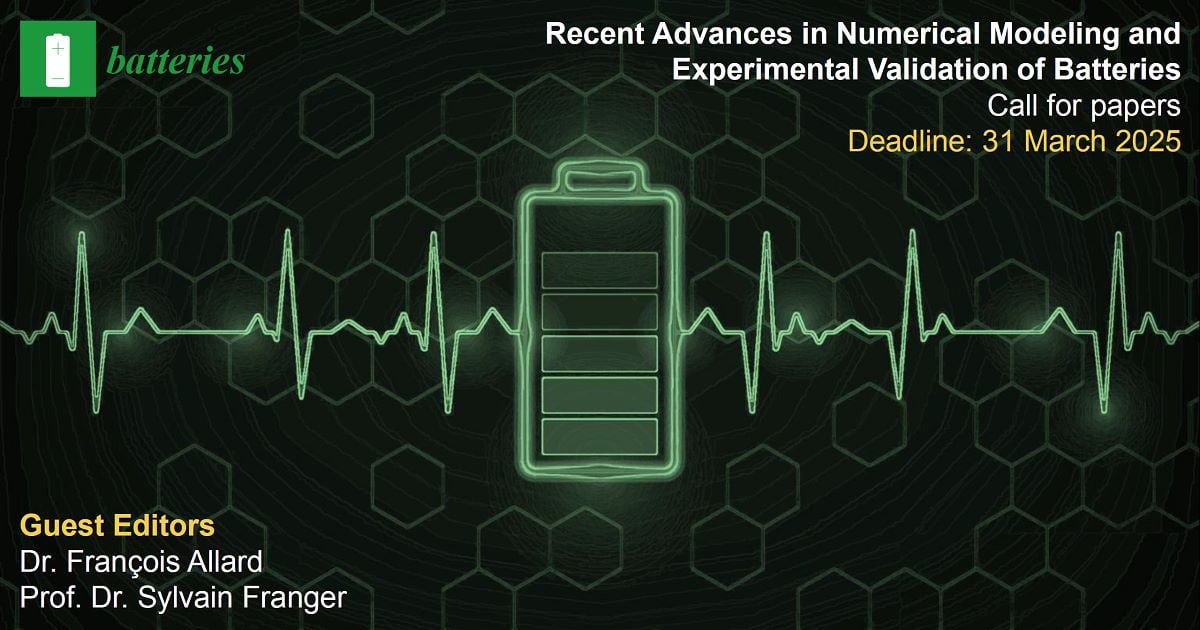Recent Advances in Numerical Modeling and Experimental Validation of Batteries
A special issue of Batteries (ISSN 2313-0105). This special issue belongs to the section "Battery Modelling, Simulation, Management and Application".
Deadline for manuscript submissions: 15 December 2025 | Viewed by 503

Special Issue Editors
Interests: numerical modeling; finite element method; experimental validation; heat and mass transfer; metallic anode; lithium batteries; solid electrolytes; hydrogen production; metal production; all-solid-state batteries; applied electrochemistry
Interests: materials chemistry; solid-state electrochemistry; impedance spectroscopy; electrochemical modeling; energy storage: Li-based batteries; Na-based batteries; all-solid-state batteries; microbatteries; supercapacitors; energy conversion: electrocatalysis for hydrogen technologies
Special Issues, Collections and Topics in MDPI journals
Special Issue Information
Dear Colleagues,
Batteries (including metal-ion, all-solid-state, and metal–air batteries) can be engineered using numerical methods (i.e., finite element analysis, mathematical models, and so on) for the sustainable and rapid development of electric vehicles, portable electronics, and renewable energy storage systems. This Special Issue delves into the latest numerical modeling techniques and their critical role in enhancing our understanding of battery performance, efficiency, and lifespan. Contributors highlight innovative computational methods that predict battery behavior under various conditions, thereby aiding in the design of more robust, sustainable, and efficient batteries. A significant focus is placed on the determination of material properties essential for supplying accurate data to numerical models. The Special Issue also emphasizes the importance of experimental validation, presenting studies where theoretical models are rigorously tested against experimental data to ensure accuracy and reliability.
In this Special Issue, scientists and engineers are encouraged to submit articles addressing the following topics:
- Advanced numerical modeling techniques: development of new algorithms for simulating battery behavior.
- Material property determination: techniques for measuring material properties critical to numerical simulation.
- Electrochemical simulation: modeling of electrochemical reactions within the battery.
- Thermal management strategies: modeling heat generation and dissipation in lithium batteries.
- Degradation mechanisms: investigations into the chemical and mechanical degradation of battery components.
- Experimental validation: development of protocols for validating model accuracy and reliability.
- Integration of machine learning algorithms: combining machine learning with traditional modeling techniques.
- Battery design optimization: application of numerical models to optimize battery design for specific applications (i.e., electric vehicles, energy storage systems, and so on).
Dr. François Allard
Prof. Dr. Sylvain Franger
Guest Editors
Manuscript Submission Information
Manuscripts should be submitted online at www.mdpi.com by registering and logging in to this website. Once you are registered, click here to go to the submission form. Manuscripts can be submitted until the deadline. All submissions that pass pre-check are peer-reviewed. Accepted papers will be published continuously in the journal (as soon as accepted) and will be listed together on the special issue website. Research articles, review articles as well as short communications are invited. For planned papers, a title and short abstract (about 100 words) can be sent to the Editorial Office for announcement on this website.
Submitted manuscripts should not have been published previously, nor be under consideration for publication elsewhere (except conference proceedings papers). All manuscripts are thoroughly refereed through a single-blind peer-review process. A guide for authors and other relevant information for submission of manuscripts is available on the Instructions for Authors page. Batteries is an international peer-reviewed open access monthly journal published by MDPI.
Please visit the Instructions for Authors page before submitting a manuscript. The Article Processing Charge (APC) for publication in this open access journal is 2700 CHF (Swiss Francs). Submitted papers should be well formatted and use good English. Authors may use MDPI's English editing service prior to publication or during author revisions.
Keywords
- battery modeling
- measuring material properties
- validating model accuracy
- electrochemical models
- chemical and mechanical degradation
- state of charge and health estimation
Benefits of Publishing in a Special Issue
- Ease of navigation: Grouping papers by topic helps scholars navigate broad scope journals more efficiently.
- Greater discoverability: Special Issues support the reach and impact of scientific research. Articles in Special Issues are more discoverable and cited more frequently.
- Expansion of research network: Special Issues facilitate connections among authors, fostering scientific collaborations.
- External promotion: Articles in Special Issues are often promoted through the journal's social media, increasing their visibility.
- Reprint: MDPI Books provides the opportunity to republish successful Special Issues in book format, both online and in print.
Further information on MDPI's Special Issue policies can be found here.






